The fight to protect the environment often looks like a battle between David and Goliath. And the Goliaths of our world will stop at nothing to silence those who oppose their destructive projects. One of their favourite weapons? SLAPPs.
Strategic Lawsuits Against Public Participation (SLAPPs) are lawsuits that are filed with the intent to censor, intimidate, or silence critics by burdening them with the cost of a legal defence until they abandon their criticism or opposition. Major corporations have resorted to SLAPPs in an attempt to stifle dissent and discredit environmental advocates.
For the likes of corporate bullies like Shell, SLAPP lawsuits are about outspending opponents to intimidate them into silence. For Indigenous Peoples, NGOs like us, class action communities, fighting such SLAPP suits is about movement building in opposition to colonialist, domineering, rampant, and arrogant international companies and their destructive projects, whether in the energy sector, agribusiness, mining, chemicals, forestry, etc.
Despite facing several SLAPPs and colossal challenges, Greenpeace International’s legal team continues to fight back. Their tenacity and ingenuity have earned them recognition by the Financial Times as one of the most innovative and impactful in-house legal teams this year for both their efforts on strategic litigation, placing communities at the centre to challenge the world’s biggest polluters, and combating the threats posed by SLAPPs. Here’s a closer look at some of the most high-profile SLAPP suits Greenpeace has faced and is still facing, and what we are doing to fight them.
1. Shell vs. Greenpeace
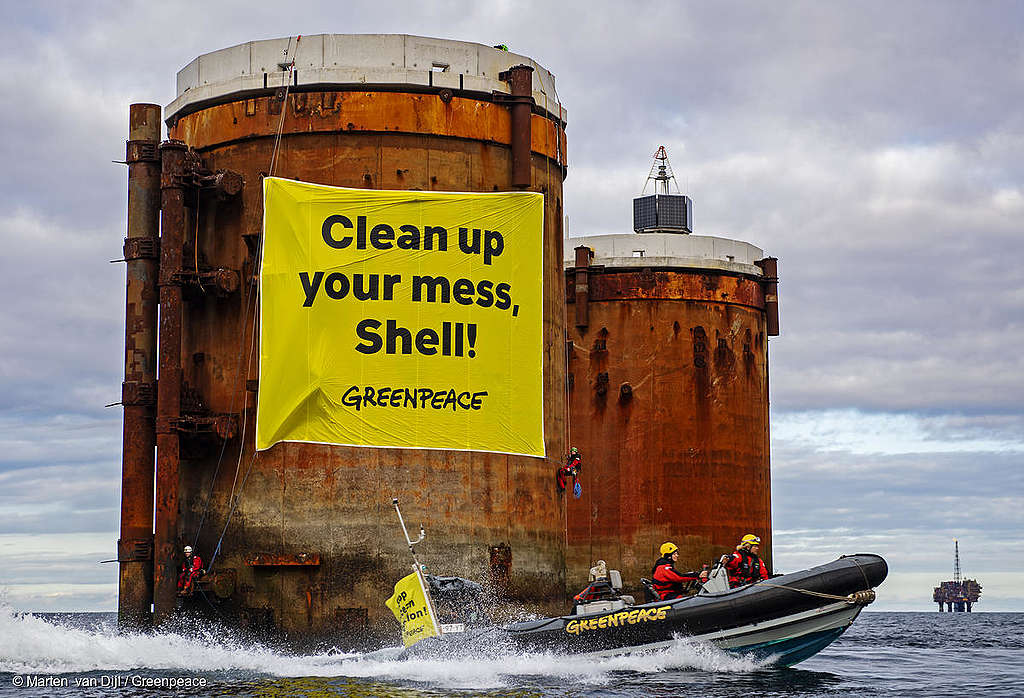 October 2019 – Greenpeace activists from the Netherlands, Germany and Denmark boarded two oil platforms in Shell’s Brent field in a peaceful protest against plans by the company to leave parts of old oil structures with 11,000 tons of oil in the North Sea. © Marten van Dijl / Greenpeace
October 2019 – Greenpeace activists from the Netherlands, Germany and Denmark boarded two oil platforms in Shell’s Brent field in a peaceful protest against plans by the company to leave parts of old oil structures with 11,000 tons of oil in the North Sea. © Marten van Dijl / GreenpeaceThis case marks one of the most significant legal challenges Greenpeace has ever faced. Shell is the second-largest investor-owned oil company in the world (after ExxonMobil) and the 15th largest company in the world.
Shell’s lawsuit stems from a peaceful protest by Greenpeace International in 2023, where activists occupied a moving oil platform to draw attention to the climate harm caused by Shell’s operations. We urged the oil giant to halt its oil and gas drilling and to take responsibility for the environmental damage it has caused, which should include financial contributions to the international climate Loss and Damage fund.
Initially, Shell warned of a possible claim for over US$ 8 million in damages but later proposed a settlement of US$ 1.4 million along with a legal agreement that Greenpeace would be permanently barred from protesting on any of Shell’s infrastructure, whether in port or at sea, anywhere in the world. Greenpeace UK and International countered by offering to agree to the protest ban, but only if Shell commits to cutting its emissions by 45% by 2030, in line with a court order from the Netherlands.
Shell has since commenced formal legal proceedings in the UK Courts where it is claiming damages and exorbitant legal costs in a bid to silence Greenpeace UK and Greenpeace International. Greenpeace UK is asking for emergency donations to help fight this abusive claim.
2. Energy Transfer vs. Greenpeace
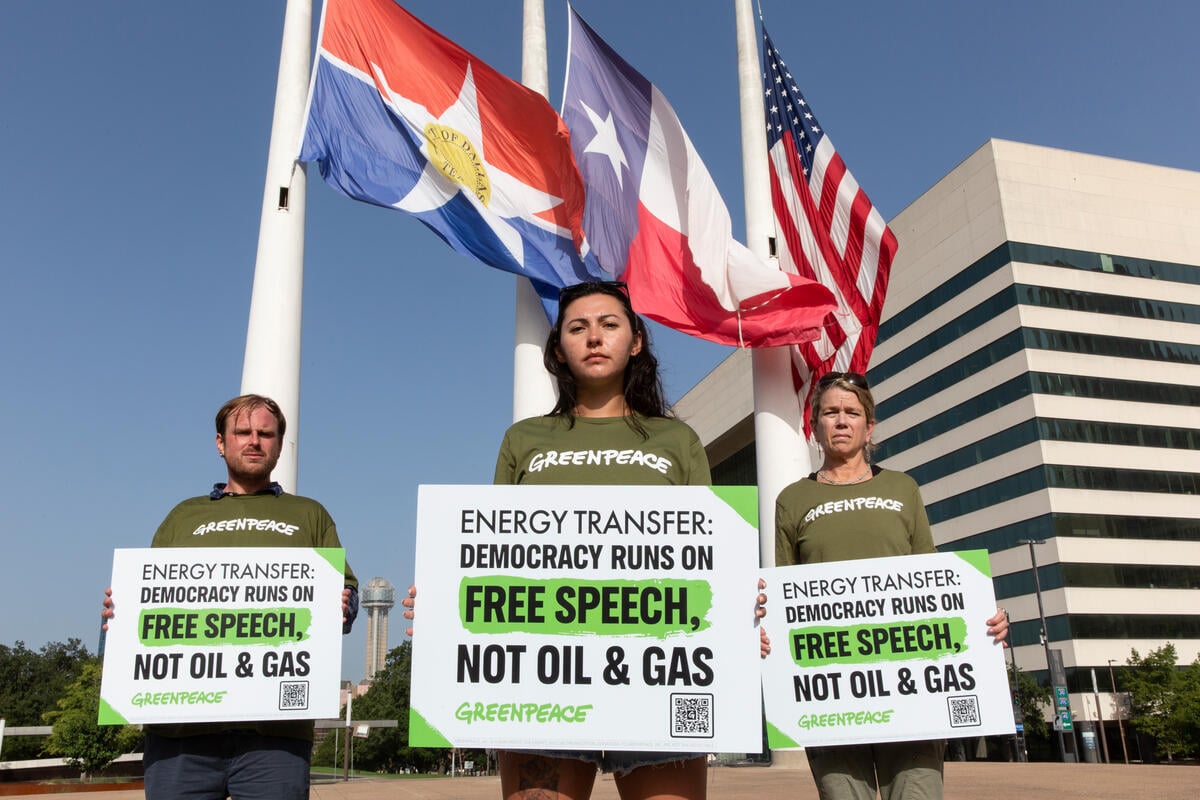 August 2024 – Free Speech Message Delivered to Energy Transfer in Dallas. Greenpeace activists stand outside Dallas City Hall with signs for a recent campaign aimed at Energy Transfer. © Laura Buckman / Greenpeace
August 2024 – Free Speech Message Delivered to Energy Transfer in Dallas. Greenpeace activists stand outside Dallas City Hall with signs for a recent campaign aimed at Energy Transfer. © Laura Buckman / GreenpeaceGreenpeace International and Greenpeace entities in the US are facing a trial in North Dakota, brought by Energy Transfer, the company behind the Dakota Access Pipeline, for nearly US$ 300 million. A loss for Greenpeace could have devastating consequences for environmental activism in the US and globally.
The lawsuit stems from the 2016 Indigenous-led protests at Standing Rock. Energy Transfer falsely claims that Greenpeace orchestrated the resistance to the Dakota Access Pipeline at Standing Rock. This makes the initiative not only a SLAPP lawsuit designed to silence critics, but also a shameless attempt to rewrite the history of the movement against this project and erase Indigenous leadership from one of the most powerful protests in history.
Greenpeace’s legal team is not only defending against these claims but also working to expose the broader implications of the pipeline’s environmental impact. This case is yet another example of how powerful entities attempt to undermine climate justice movements by leveraging their financial clout to drain resources and divert attention.
3. Resolute Forest Products vs. Greenpeace
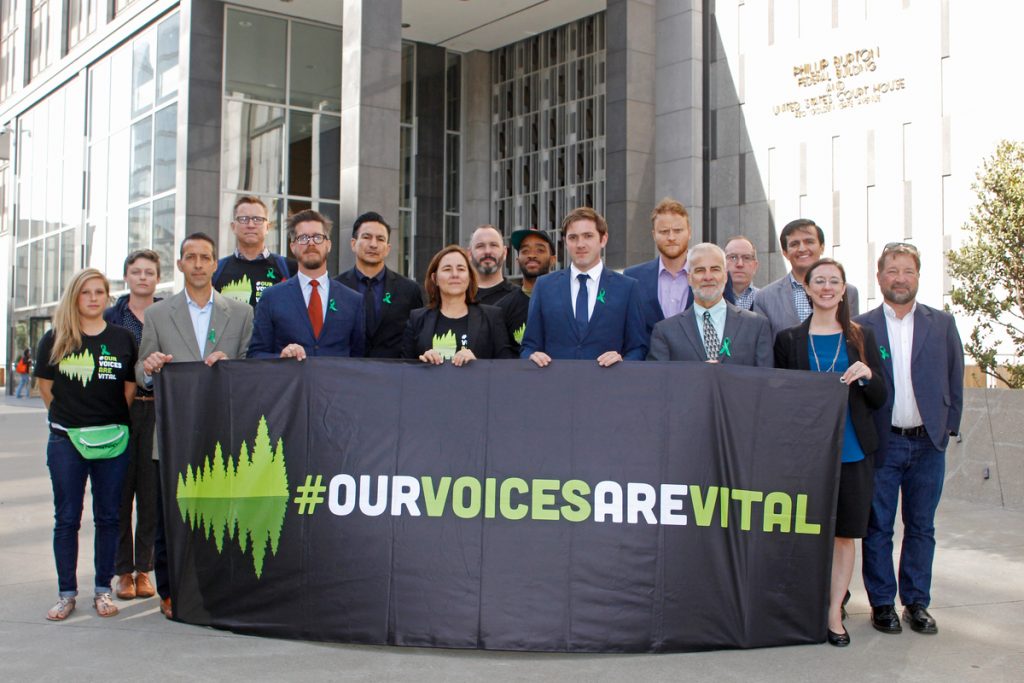 October 2017 – Participants and activists appear outside United States District Court for the Northern District of California for a hearing on the controversial racketeering case filed by logging company Resolute Forest Products to silence forest defenders and environmental organisations Greenpeace and Stand.earth. © George Nikitin / Greenpeace
October 2017 – Participants and activists appear outside United States District Court for the Northern District of California for a hearing on the controversial racketeering case filed by logging company Resolute Forest Products to silence forest defenders and environmental organisations Greenpeace and Stand.earth. © George Nikitin / GreenpeaceIn April 2023, a US federal court dismissed a seven-year lawsuit brought by Resolute Forest Products against several Greenpeace staff members and entities, including Greenpeace International and Greenpeace USA. A major victory for freedom of speech and environmental protection.
The Canadian logging company had sued the Greenpeace defendants for CA$ 100 million in an attempt to silence and financially ruin them following criticism of its unsustainable forestry practices.
Greenpeace responded by focusing on the evidence of environmental degradation caused by Resolute’s operations and mobilised its entire network and supporters in several regions of the world to denounce this unjust and disproportionate attack. The battle showcased the lengths to which corporations will go to protect their profit margins, even at the expense of crucial environmental protections.
Stronger together: an attack on one is an attack on all
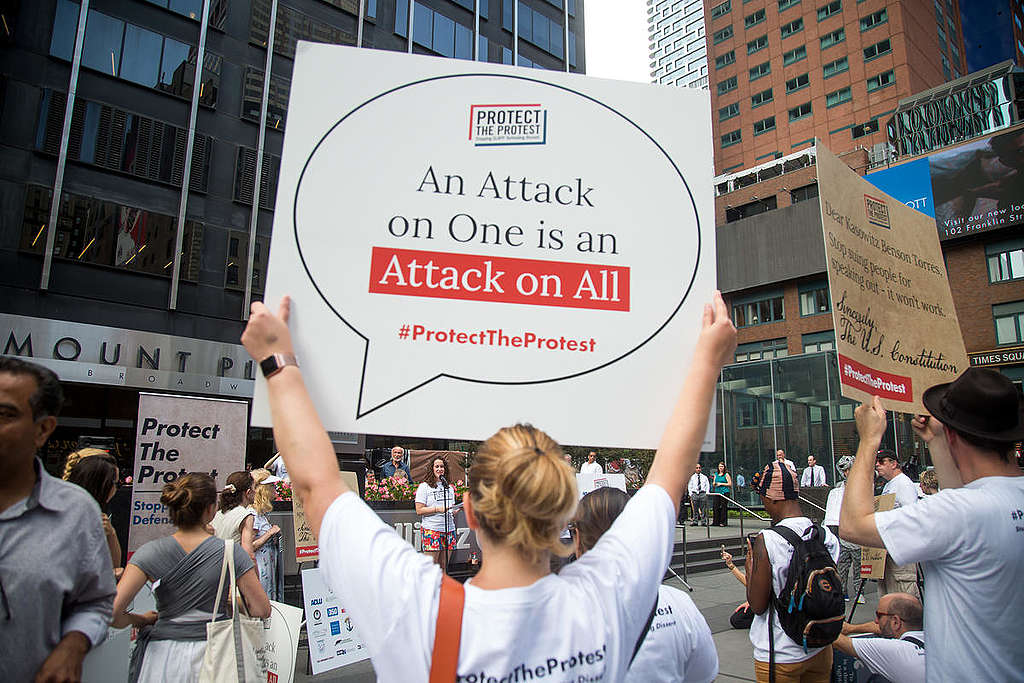 September 2018 – Individual activists and advocacy groups threatened by SLAPPs rally against corporate bullies like the Kasowitz Benson Torres law firm (hired by logging giants and oil pipeline companies to sue advocacy organisations like Greenpeace as well as dozens of individual climate activists) in New York. © Michael Nagle / Greenpeace
September 2018 – Individual activists and advocacy groups threatened by SLAPPs rally against corporate bullies like the Kasowitz Benson Torres law firm (hired by logging giants and oil pipeline companies to sue advocacy organisations like Greenpeace as well as dozens of individual climate activists) in New York. © Michael Nagle / GreenpeaceThe Greenpeace network is obviously not alone in being the target of SLAPP suits, and it is fighting against these increasingly numerous intimidation tactics alongside many other activists and organisations.
EarthRights has identified 152 cases in the past ten years where the fossil fuel industry has used SLAPPs and other judicial harassment tactics in attempts to silence or punish its critics in the United States.
A report by the Coalition Against SLAPPs in Europe (CASE) — which the Greenpeace International Legal Unit helped launch in 2020 and continues to shape through membership of its Steering Committee — documented 820 SLAPP suits in Europe as of August 2023, with 161 lawsuits filed in 2022, a significant increase in the 135 cases filed in 2021.
Alongside the members of the CASE coalition, Greenpeace actively engages in advocacy efforts to strengthen legal protections for all environmental activists and organisations fighting against corporate malfeasance. The European Union’s new anti-SLAPP Directive, adopted by the EU in March 2024 following four years of campaigning is a major victory. It is already playing a role in Greenpeace International’s fight against Energy Transfer.
When the movement fights back, it wins
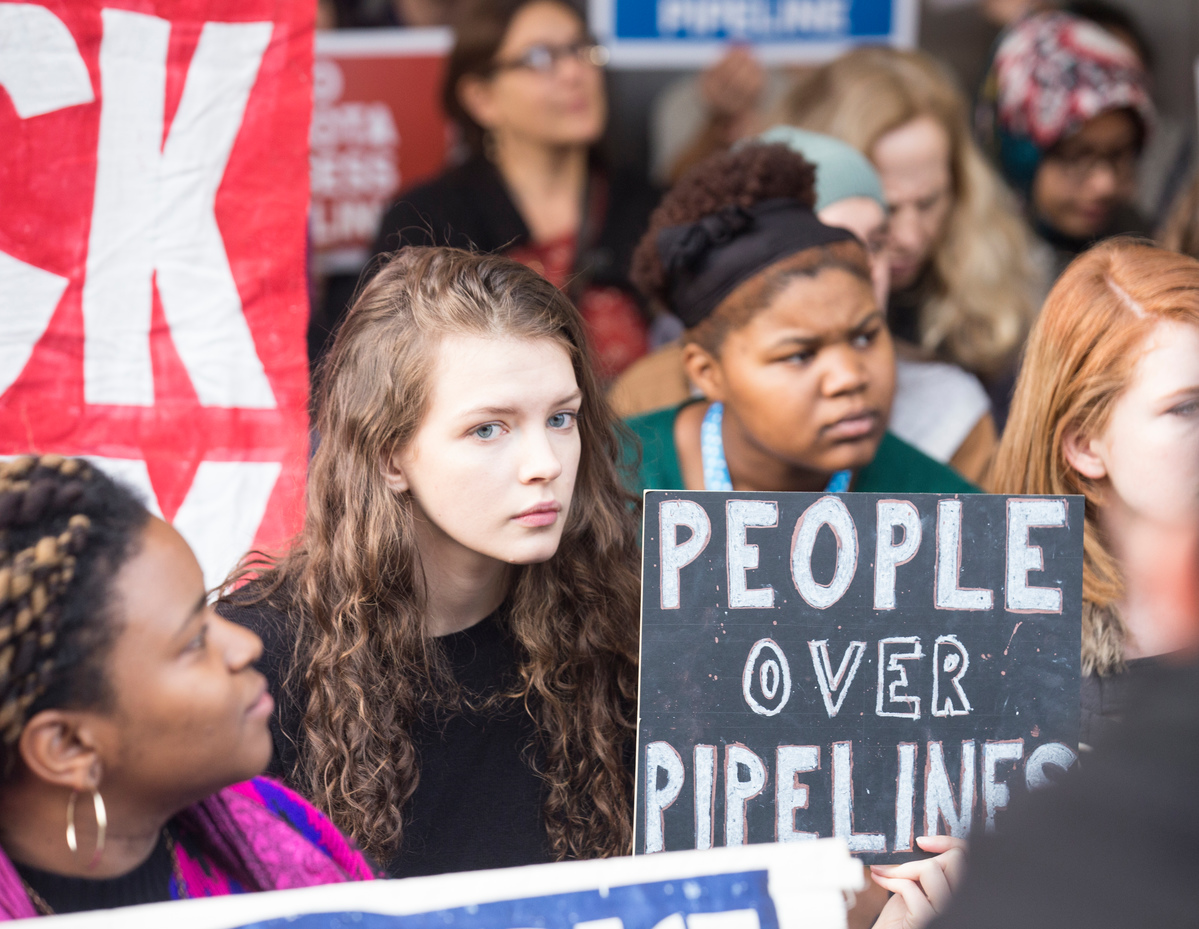 November 2016 – Dakota Access Pipeline Day of Action in Washington D.C. People hold signs at a sit in in support of the Standing Rock Nation at the U.S. Army Corps of Engineers. In actions around the world people are calling on the Corps to cancel permits for the Dakota Access Pipeline (DAPL). © Jordan Hetrick / Greenpeace
November 2016 – Dakota Access Pipeline Day of Action in Washington D.C. People hold signs at a sit in in support of the Standing Rock Nation at the U.S. Army Corps of Engineers. In actions around the world people are calling on the Corps to cancel permits for the Dakota Access Pipeline (DAPL). © Jordan Hetrick / GreenpeaceThe climate movement is not just defending itself: it is also dealing decisive blows in the trenches of law and justice.
In 2023, several landmark legal victories marked crucial steps toward climate justice and protecting people from the climate crisis. In April, the European Court of Human Rights ruled in favour of Swiss Senior Women for Climate Protection (KlimaSeniorinnen), recognising Switzerland’s failure to sufficiently reduce greenhouse gas emissions as a violation of human rights. In May, the International Tribunal for the Law of the Sea (ITLOS) classified greenhouse gas emissions as marine pollution, strengthening international environmental law and safeguarding the oceans. Additionally, the Inter-American Court of Human Rights held historic hearings, amplifying the stories of impacted Indigenous Peoples and local communities in their demand for climate justice. These actions represent significant progress in holding governments accountable and protecting vulnerably situated populations from climate-related harm.
These lawsuits represent more than just legal battles; they are emblematic of the broader struggle between corporate interests, climate inaction and the global environmental and human rights movement. Each victory against a SLAPP lawsuit, each new step forward in the recognition of the growing impact of the climate crisis and environmental degradation on our lives, sets a precedent for other activists and organisations fighting for a liveable planet and a better future.
To corporations trying to shoot down civil society, NGOs, individuals: you’d best not miss. Because we’re coming back at you, harder than ever.
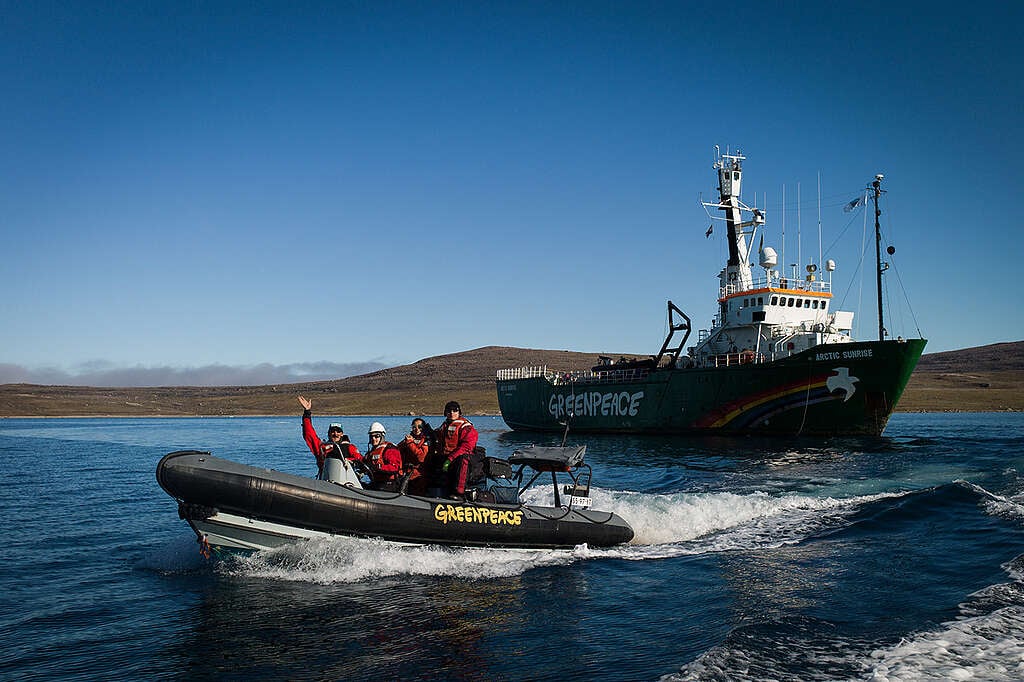
Greenpeace needs your support against Big Oil’s attempt to silence us!
Add your name
 2 months ago
51
2 months ago
51

